Travel
Written by
Hugo Cannon
Discover Puglia's everlasting allure: sun-kissed beaches, mediaeval villages, and wonderful cuisine await. Lose yourself in olive trees, discover picturesque villages, and enjoy the warmth of southern Italy's hospitality while staying at the best hotels.
Table of Contents:
Puglia, located in the sun-soaked heel of Italy's boot, is a beautiful region rich in cultural experiences and natural wonders. Puglia's gorgeous coastline, filled with fishing villages and sandy beaches, invites visitors to discover its Mediterranean charm.
Trulli, unusual cone-shaped dwellings, dot the landscape, creating a fairytale scene and giving tourists a look into Puglia's architectural originality.
Delicious cuisine entices the taste senses with local specialties like as orecchiette pasta and burrata cheese.
History whispers down the cobblestone alleyways of cities like Lecce and Alberobello, where every corner tells a story from centuries ago. Puglia welcomes you with some incredible hospitality and fantastic hotels. Take a look into our top 10 favorite stays:
Best hotels in Puglia:
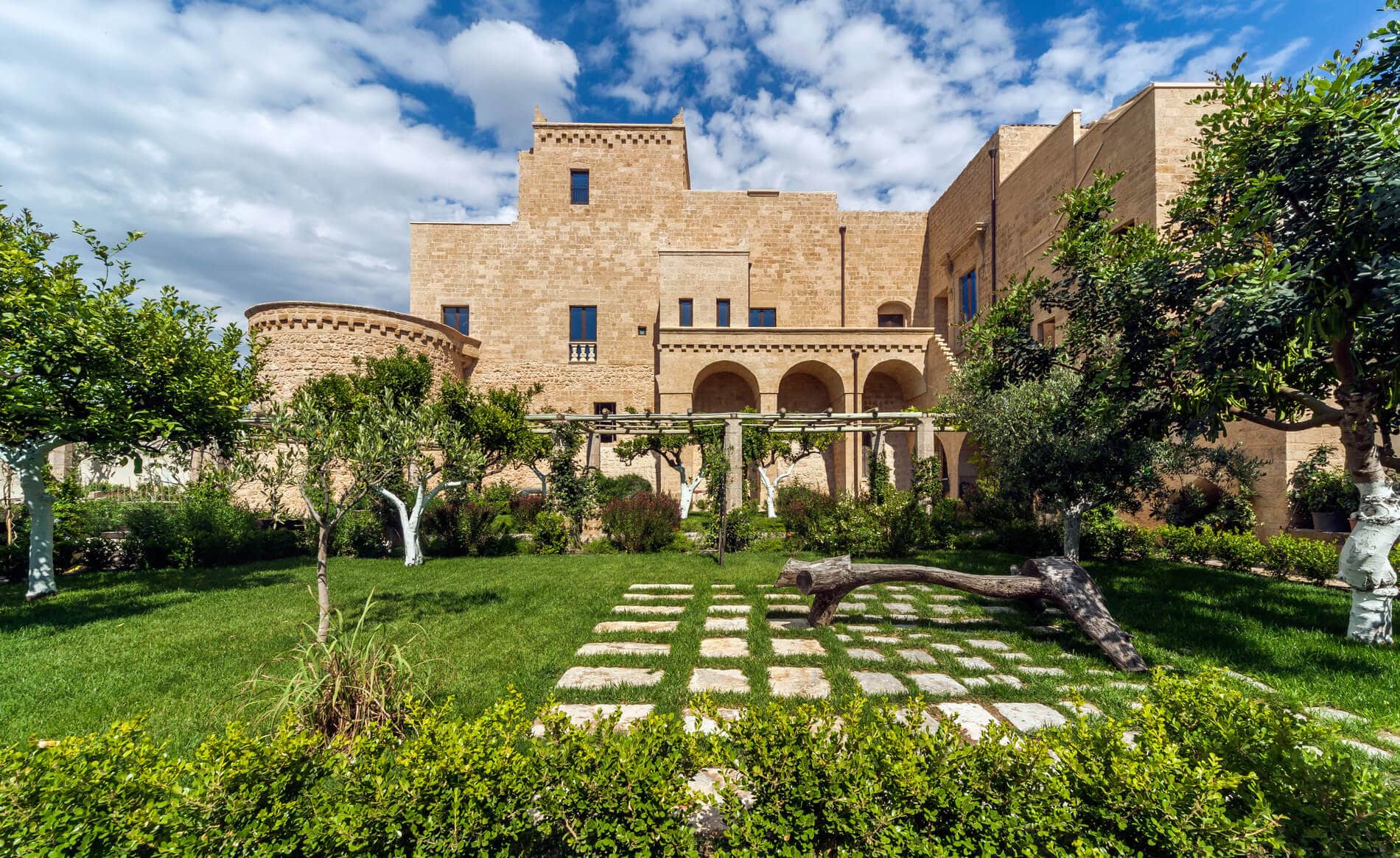
Castello di Ugento
Castello di Ugento
Castello di Ugento, a former fortress, is positioned at the highest point in Ugento, southern Puglia, with a view of flat and not always picturesque farmland terrain. It's in the heart of the peaceful town, near to the archaeological museum.
Small supermarkets, pharmacies, and the town's pizzerias are all within walking distance. The coast is 4 miles (7 kilometres) away, so it's worth renting a car to explore the area.
Ex-PepsiCo CEO Massimo d'Amore and his partner Diana Bianchi completed a six-year, €15 million (£13.2 million) renovation of the ancient castle that has been in the d'Amore family since 1643.
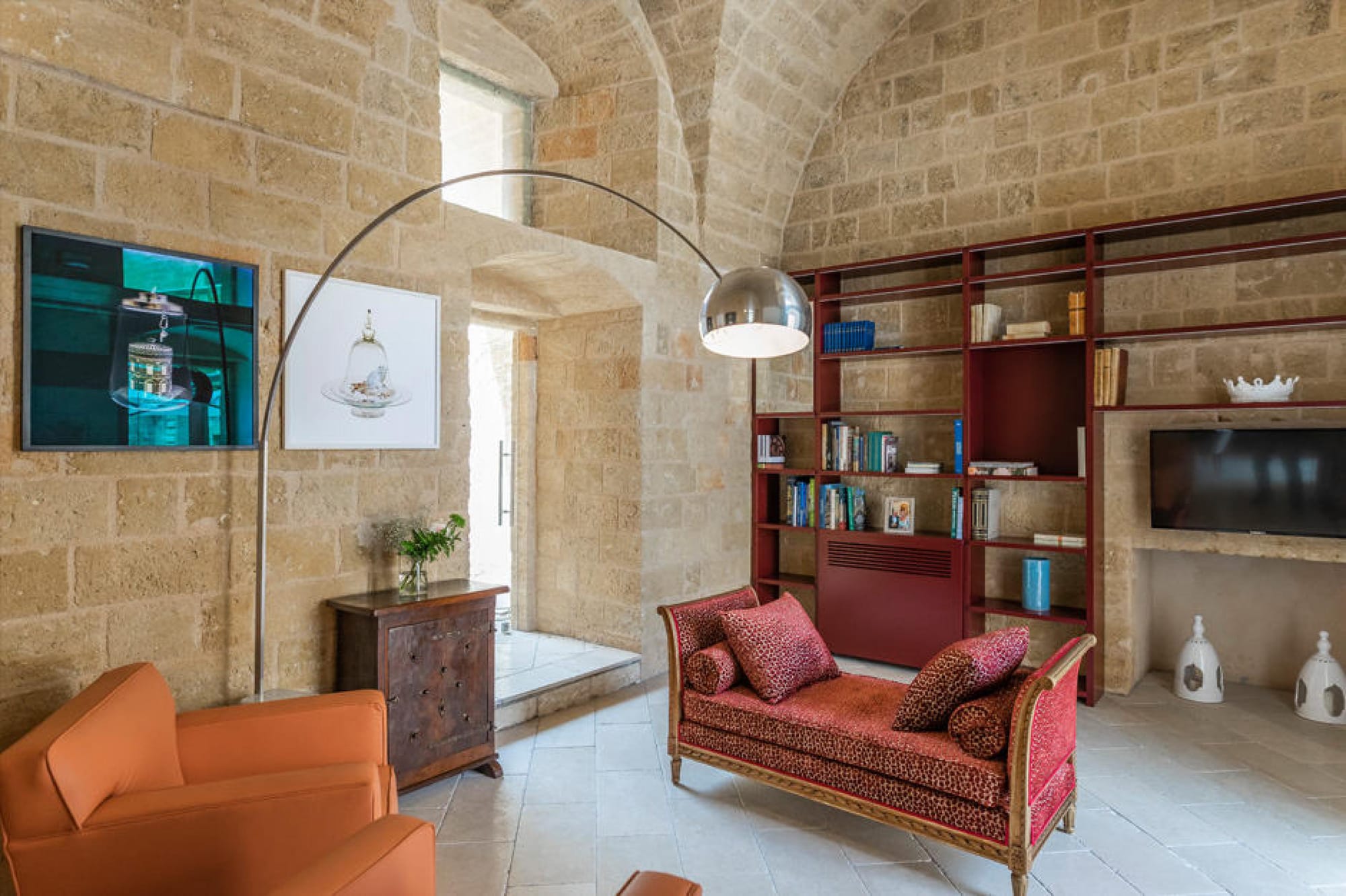
Castello di Ugento
The pietra leccese (local stone) walls were sandblasted back to their original honey hue, the walled gardens were meticulously cut, and a team of professionals was hired to recreate exquisite 17th-century murals in the first-floor salons that now make up the museum wing.
Three cutting-edge Electrolux kitchens were custom-built within the walls to create the Puglia Culinary Centre, while former staff quarters flanking a courtyard and a piece of the piano nobile were turned into nine boutique hotel rooms.
It's an impressive, antique monument with contemporary furnishings, modern art, and technological mod-cons bring it up to date, giving it a homely sense despite its size.
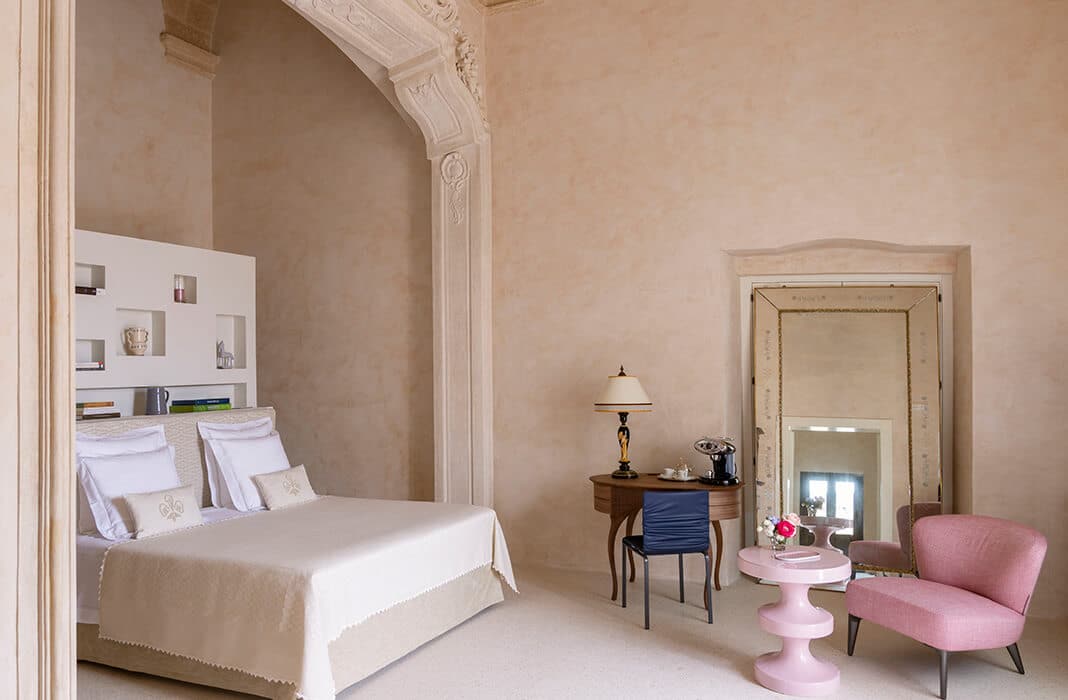
Castello di Ugento
The employees are all proud to have been involved in the castle's revitalization, and outstanding service is expected. The personable owners offer local recommendations and renovation anecdotes, while general manager Domenico Avelluto is a true character.
Cooking classes are held in state-of-the-art teaching kitchens. Afternoons can be spent relaxing in the gardens, deciphering the frescoes, or going on an excursion planned by the team.
There is no swimming pool or spa (an underground thermal bath is in the works), but guests can use the outdoor pool, fitness facility, and tennis court at sister resort Masseria Le Mandorle, which is a five-minute drive away, and in-room massages and facials are available.
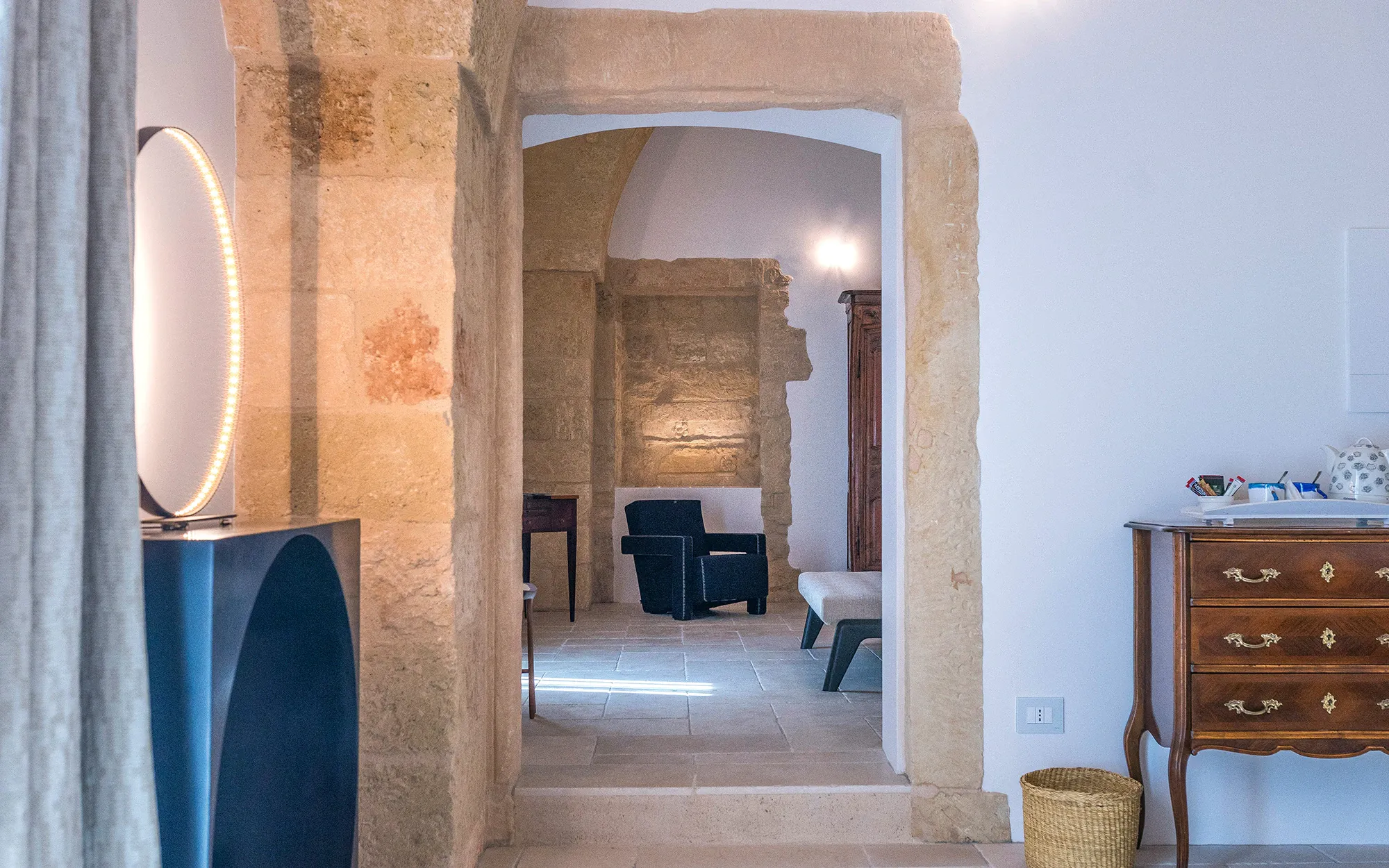
Castello di Ugento
The majority of the furniture, including creamy handwoven linens and shiny ceramics, are handcrafted by Pugliese artisans. The beds are spacious and quite comfy, and the bathrooms are outfitted with rainfall showers, luxury robes, and organic olive-oil amenities.
The owners' fine eye for modern architecture is matched by an obsession with technology, which means that usual annoyances like inconsistent Wi-Fi, a lack of coathangers, and confusing lighting settings do not exist here.
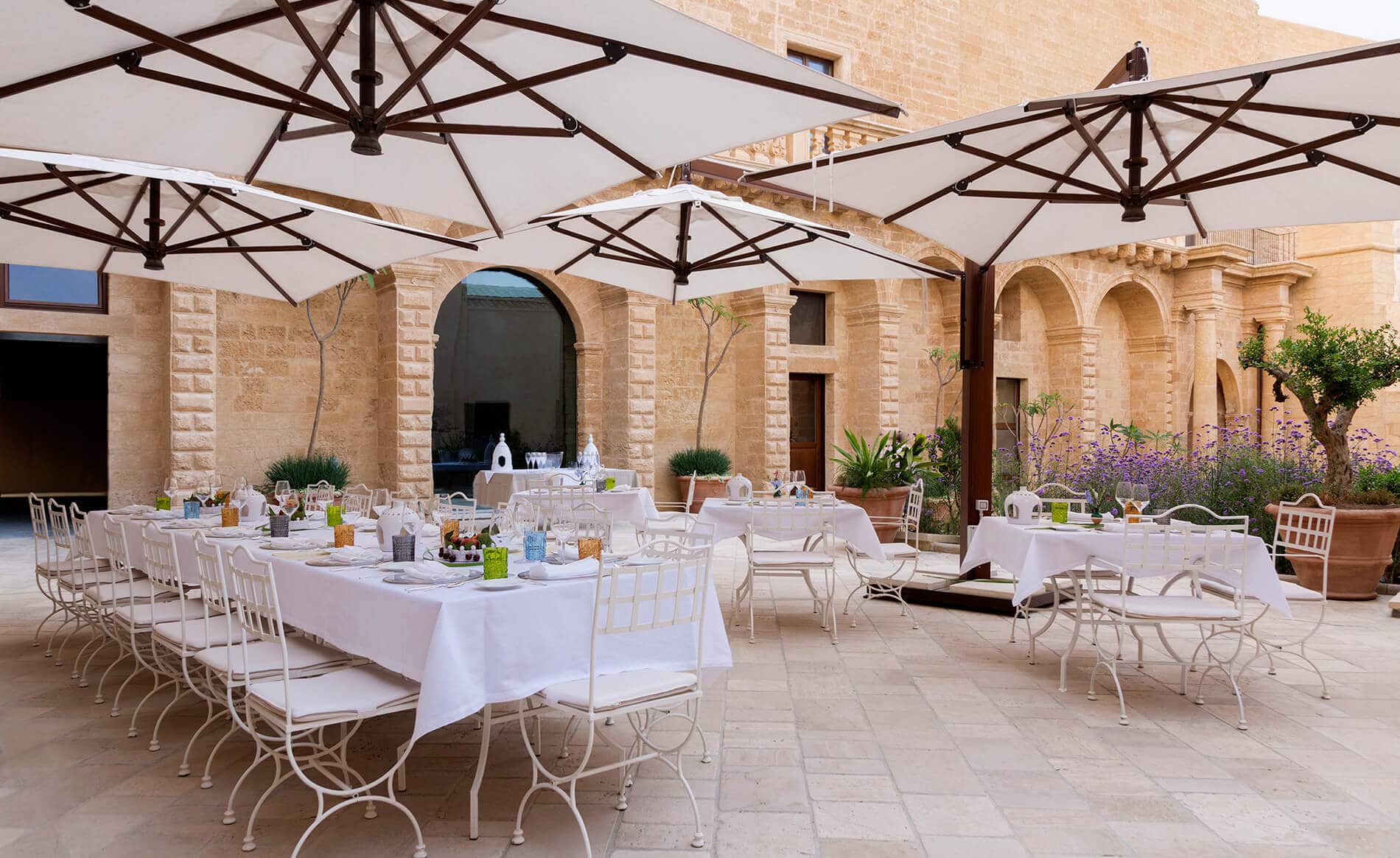
Castello di Ugento
The food at the Puglia Culinary Centre is exceptional, as one would expect. Il Tempo Nuevo, the hotel's restaurant, serves modern twists on traditional Puglian cuisine, with ingredients gathered from local markets and the castle's kitchen garden. A daily-changing menu might include bottoni cacio e pepe, grilled fish, and deconstructed tiramisu.
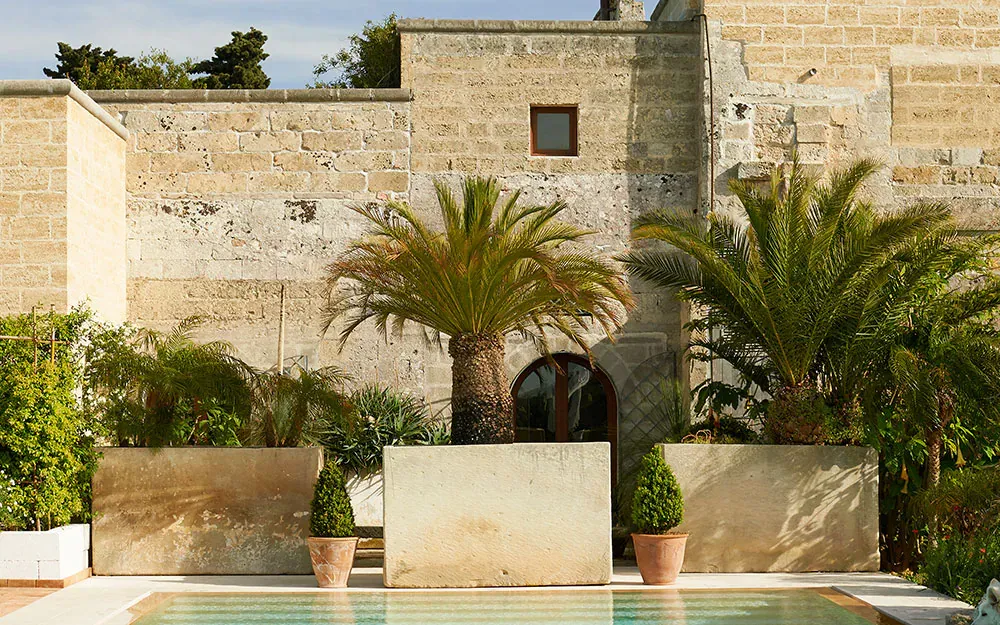
Convento di Santa Maria di Costantinopoli
Convento di Santa Maria di Costantinopoli
This hidden gem is located in the village of Marittima di Diso, a half-hour drive from the picturesque town of Lecce, along the meandering coastal road.
The 15th-century Convento is not your average hotel. Lady Athena, the late Lord McAlpine's wife, runs the guest house, which she describes beautifully as a cross between an English country house party and a summer on a Greek island.

Convento di Santa Maria di Costantinopoli
The pleasantly cool and tranquil inner courtyard provides a welcome hideaway from the frequently hot Puglian surroundings, especially in the summer.
The former convent's corridors and galleries are filled with Moroccan carpets, Nigerian wooden carvings, Aboriginal art, Zulu ceramics, Madras glass paintings, Ethiopian manuscripts to banish evil spirits, and 14 tonnes of books, nearly all of which are first editions.
The quality of the items on show is exceptional, and none would look out of place in a museum. There is a gorgeous rooftop terrace with potted cactus plants, as well as a herb garden with over 80 different species of mint.
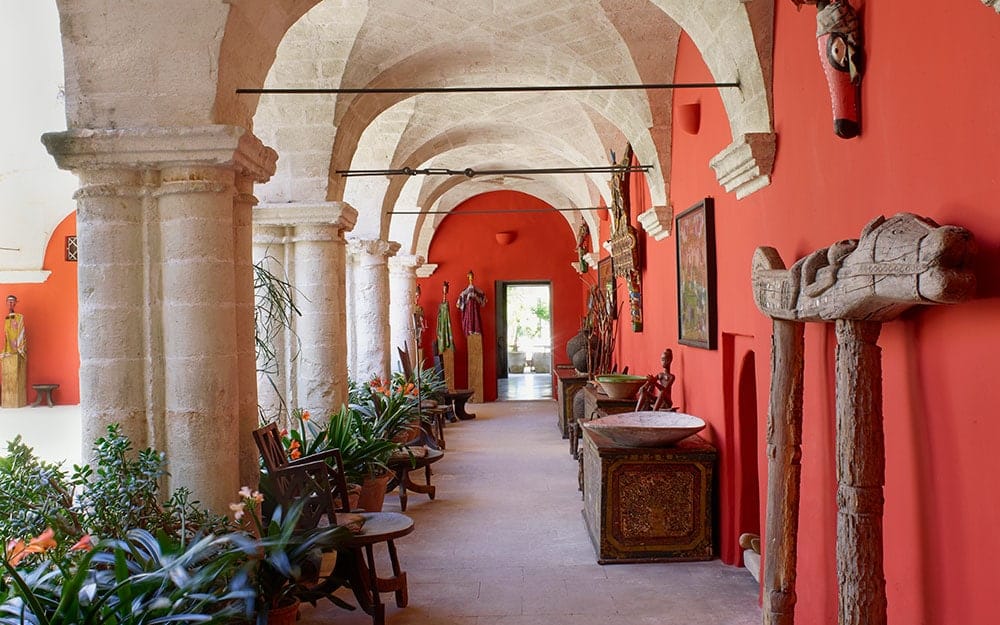
Convento di Santa Maria di Costantinopoli
The service is really personal and attentive, like staying in someone's summer home. Nothing is too much to ask, and advice from staff for places to dine, drink, swim, and explore are the best you can get.
You can unwind by the pool or in one of the many hidden spots nestled in the enormous garden that surrounds the Convento, or simply sink into the soft cushions in the cool inner courtyard.
Each of the six rooms is furnished in its own style, with some including an elegant bath in the room and others featuring balcony doors that open to overlook the herb garden.
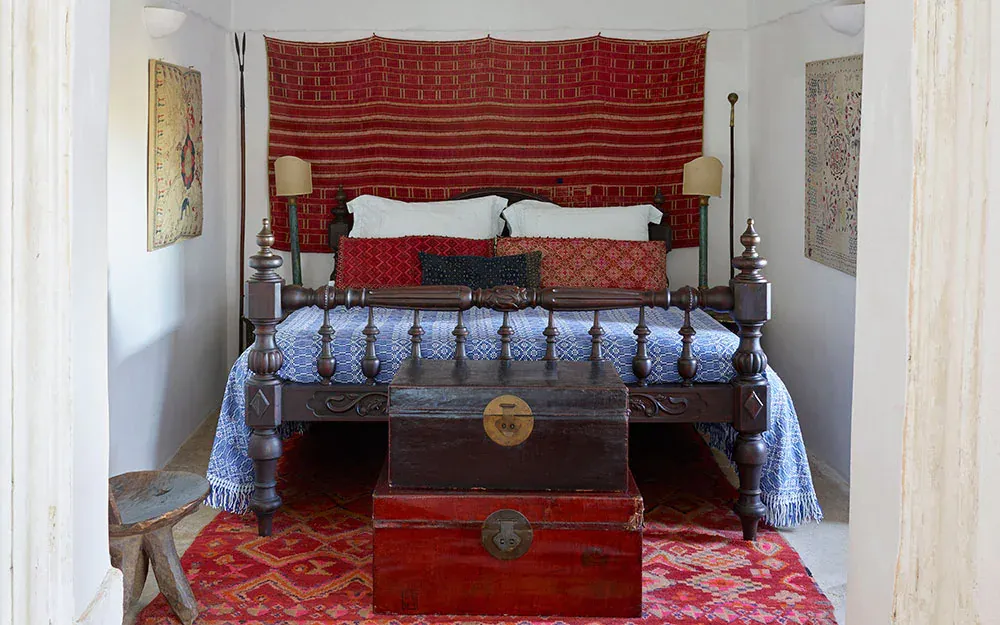
Convento di Santa Maria di Costantinopoli
The ancient beds have hand-embroidered linen and traditional handwoven Salentine bedspreads, as well as thick Welsh blankets for the winter months. There is no air-conditioning, TV, telephone, or Wi-Fi in this location, so be prepared for unexpected surprises. Staying here means embracing unconventional luxury but having an authentic experience.
Forget the traditional Italian breakfast. Instead, visitors at the Convento can eat till late in the morning, feeding themselves from the exquisitely arranged breakfast table, a banquet of sweets and healthy options to begin the day.
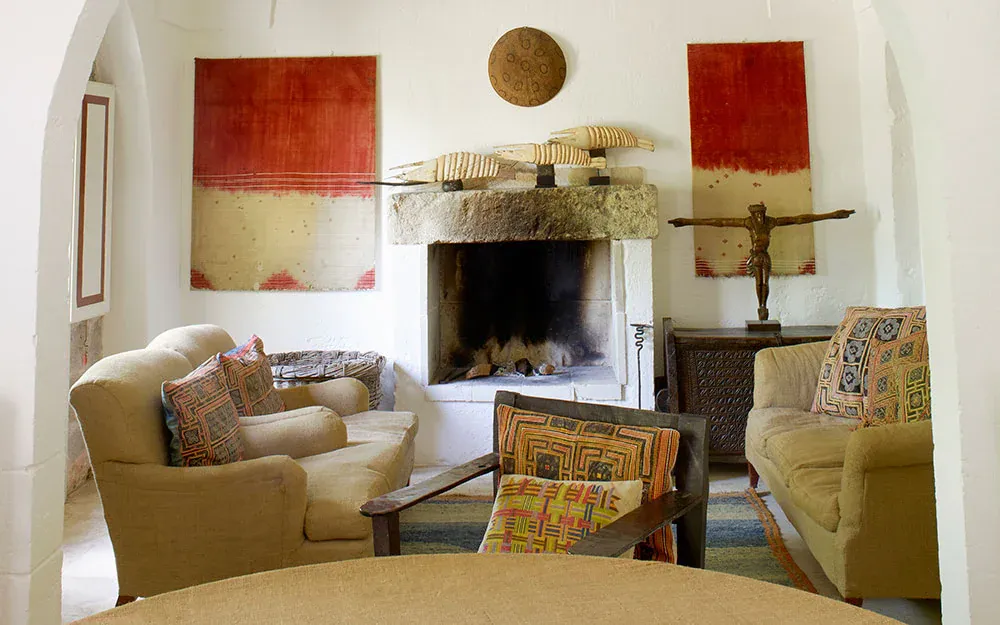
Convento di Santa Maria di Costantinopoli
A little later, lunch is served with a plethora of fresh local cheeses, seasonal fruit and vegetables, and, of course, fresh pasta, followed by wonderful but light second courses.
All customers are welcome to stroll in and out of the open kitchen and serve themselves to wine, Italian birra, fizzy drinks, and freshly made snacks, which are available all day.
The chef and his assistants will occasionally share some of the kitchen's secrets with guests so they can try them at home.
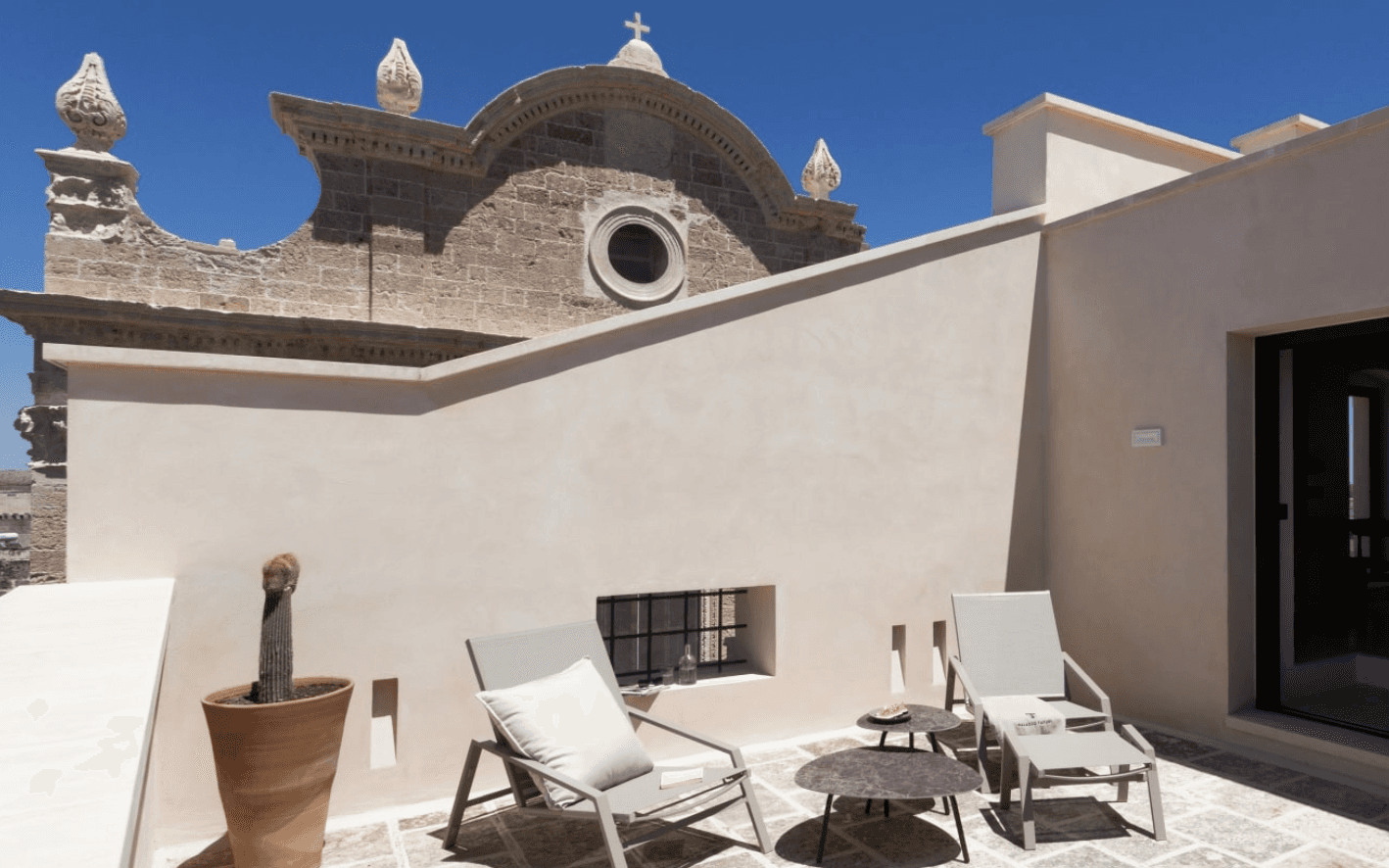
Palazzo Tafuri
Palazzo Tafuri
The hotel, located in Nardò's historic district, is surrounded by Moorish and Baroque buildings and directly across from the beautiful Monastery Santa Chiara.
Local stores, pubs, and restaurants are just a few minutes' walk away, and the nearest beaches and the Porto Selvaggio National Park are five miles (8 kilometres).
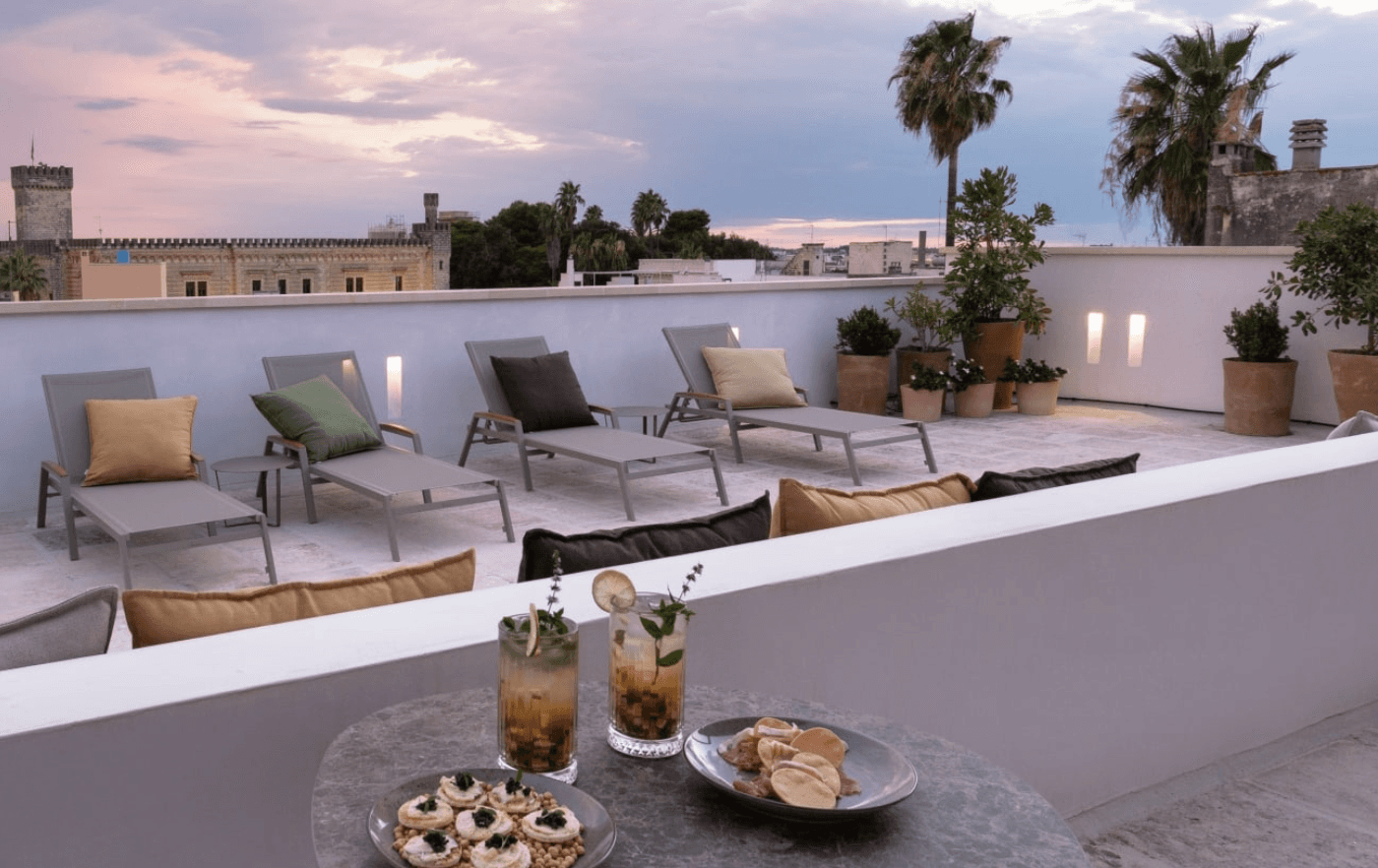
Palazzo Tafuri
This location is great for woodland hikes and admiring the bay where the pine trees meet the sea creating an unforgettable scenario.
Brindisi is the nearest airport, at 50 miles (70 km), and takes less than an hour to drive from. Bari airport is 130 miles (190 kilometres) away and takes two hours to reach from the hotel.
The proprietors, the Count and Countess d'Espous, gave architects Claudio Colaci (from Salento) and interior designer Vincent De Cat complete freedom and you can see it paid off.
This hotel stands out with its masterful blend of vintage and contemporary furniture. Terracotta pots, linen furnishings, stone floors, and rich velvets are artfully mixed to create a historic yet creative townhouse atmosphere.
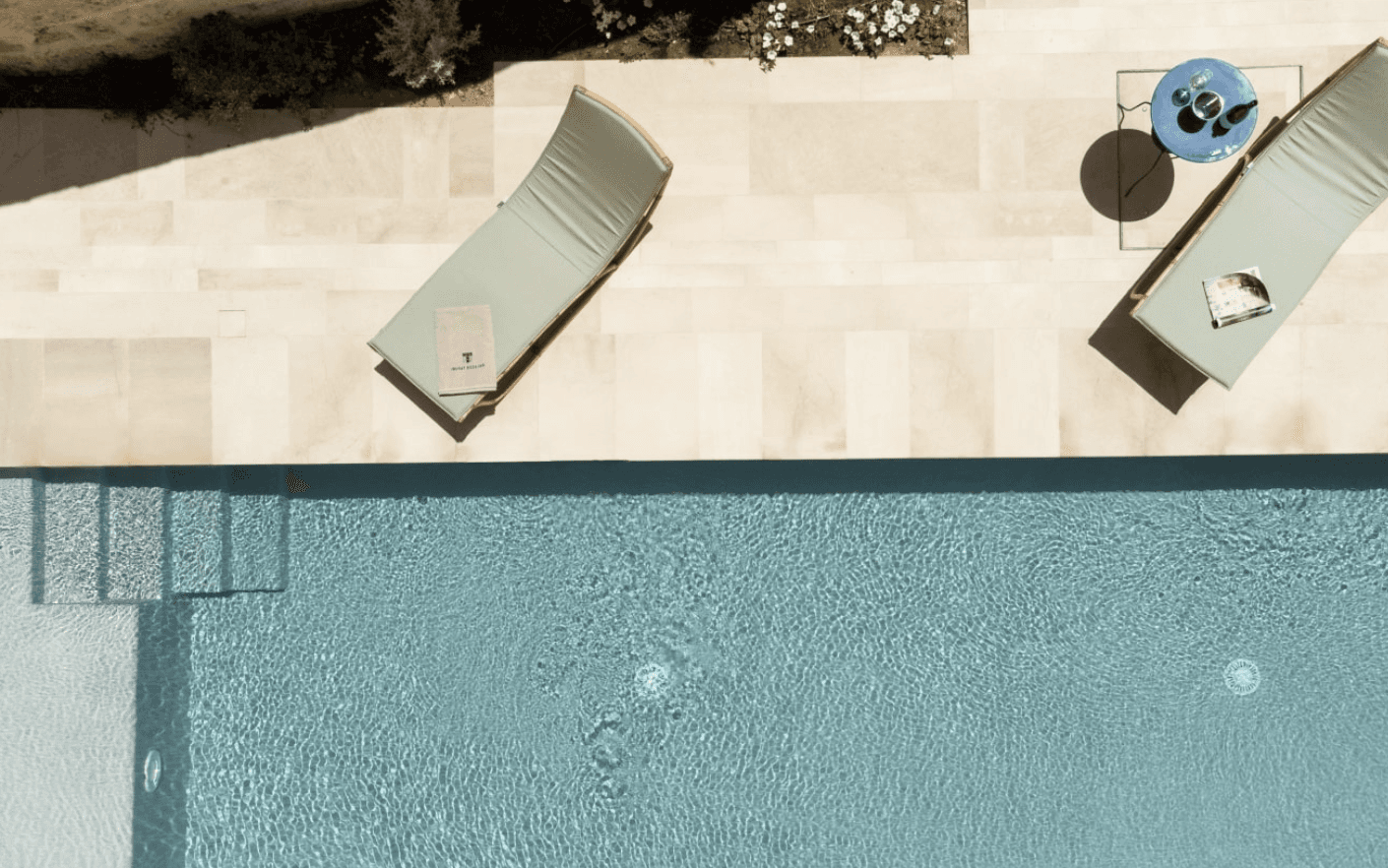
Palazzo Tafuri
Countess d'Espous, President of the French Botanic Park Association, ensures that the property's biscuit tones are punctuated by powerful vegetation that is taken care of year around.
The large 17 rooms and suites offer all the amenities of a modern boutique hotel. Bathed in light, they highlight the wonderful architecture of the time.
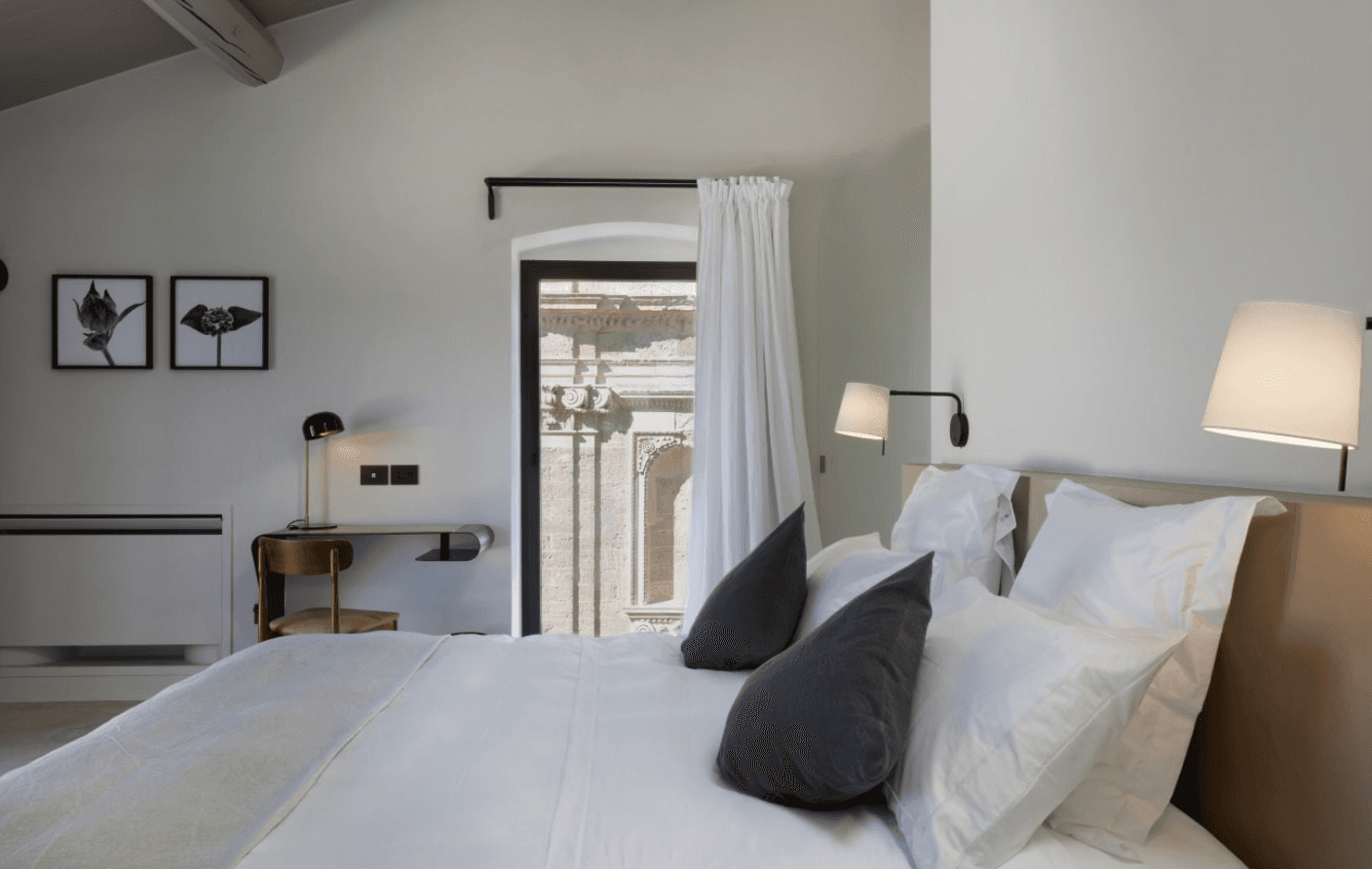
Each room has a unique design, some have stone vaulted ceilings with painted frescoes and others boasting outdoor terraces. Standard features include stone basins, walk-in rain showers, and premium Ortigia amenities.
The picturesque Tafuri Courtyard restaurant is surrounded by tall cactus. It is the ideal location for an al fresco dining, with thoughtful lighting.
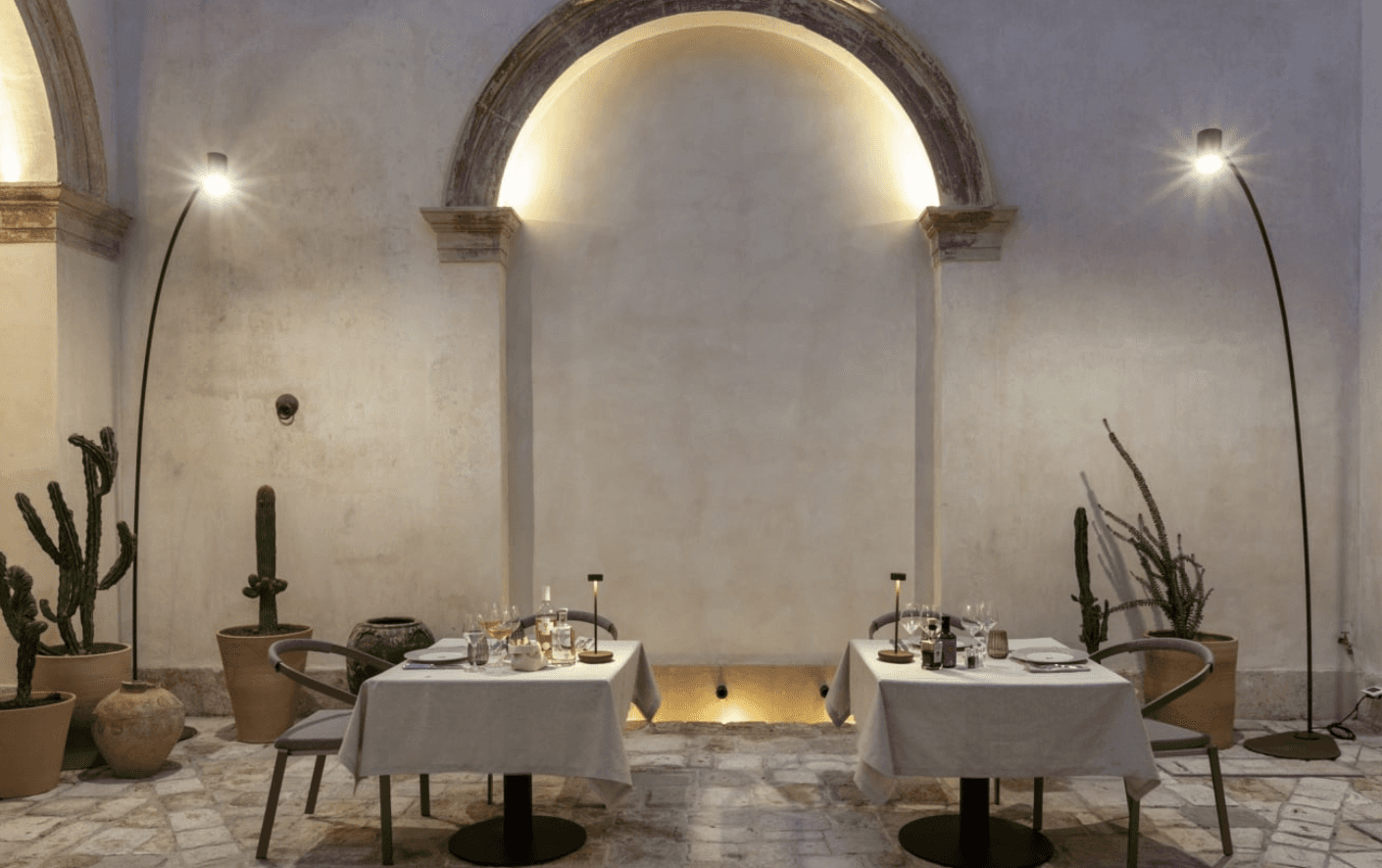
Palazzo Tafuri
Antonio Capoccello, a talented chef from Salento, approaches cuisine with creativity and sustainability. Antipasti include a modern take on the Italian classic vitello tonnato, including Podolica Querceta veal, caper blossoms, and crusco pepper.
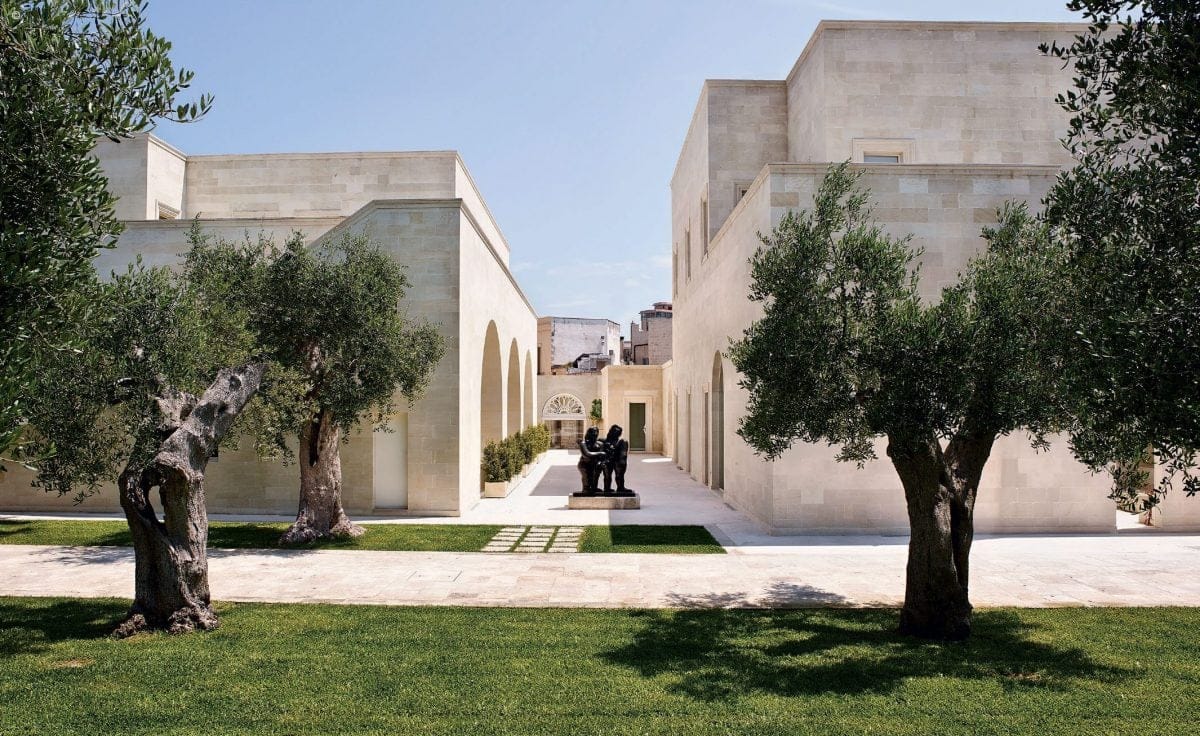
La Fiermontina Urban Resort
La Fiermontina Urban Resort
Lecce, one of Puglia's most attractive cities, is a feast for the eyes, with Baroque churches and aristocratic palazzi built in the region's signature golden limestone. La Fiermontina is located at the edge of the old town, nestled in its own olive grove (complete with outdoor swimming pool) and only a 10-minute walk from all of the main tourist attractions.
The hotel is in a limited traffic area, however you can drive to the entrance and use the valet parking facility. The east coast of Puglia is only 20 minutes away by vehicle, and the international airport at Brindisi is half an hour north.
A magnificent Baroque masseria transformed into a trendy urban retreat. The soul of the building is a superb collection of 20th-century art works inspired by the muse, model, and painter Antonia Fiermonte, the present owners' grandmother.
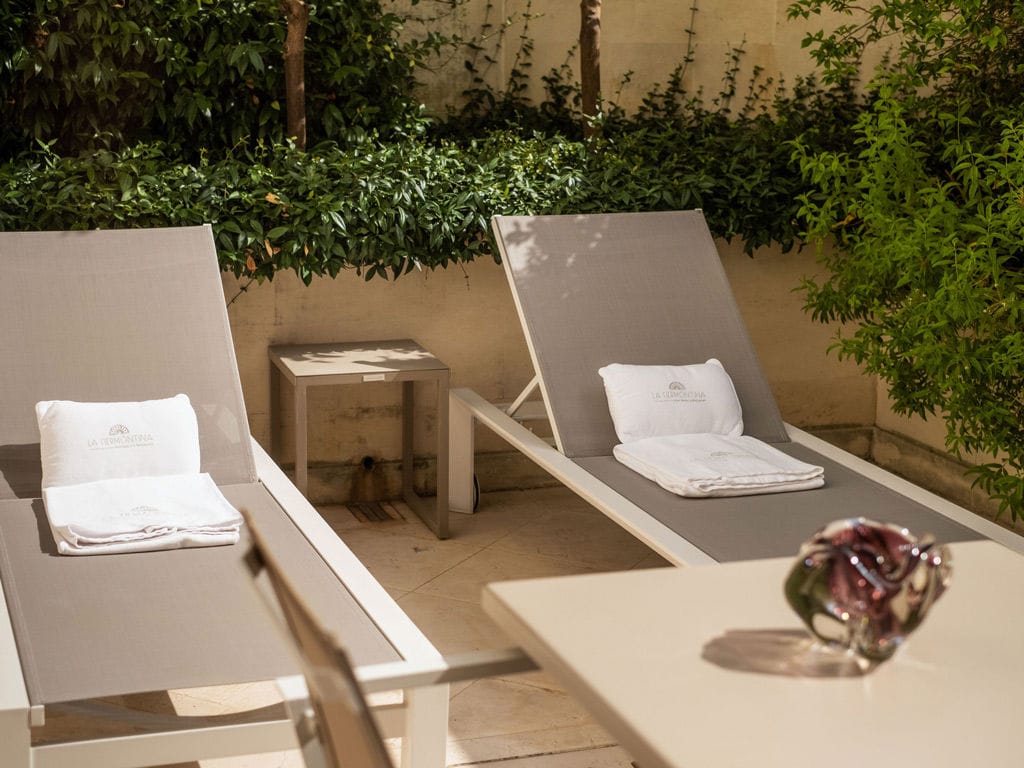
La Fiermontina Urban Resort
René Letourneur's Matisse-like nudes lie alongside Rodin-esque sculptures by Jacques Zwobada - both exceptional French artists who fell in love with Fiermonte. The minimalist interiors are done in light, neutral tones, with plenty of blonde Leccese stone and a mix of vintage and designer furnishings. Outside, the gardens are surrounded by the historic city walls.
The staff is always pleasant, and amenities include luggage transportation, valet parking, cooking workshops, wine tastings, massage treatments, museum excursions, and distinctive experiences that showcase the region's history and customs.
Given its urban surroundings, the isolated olive grove and open-air pool are a welcome during the long Puglian summers. In chilly weather, the fire-placed, art-filled living room is an ideal location to cosy up with one of the many coffee-table novels.
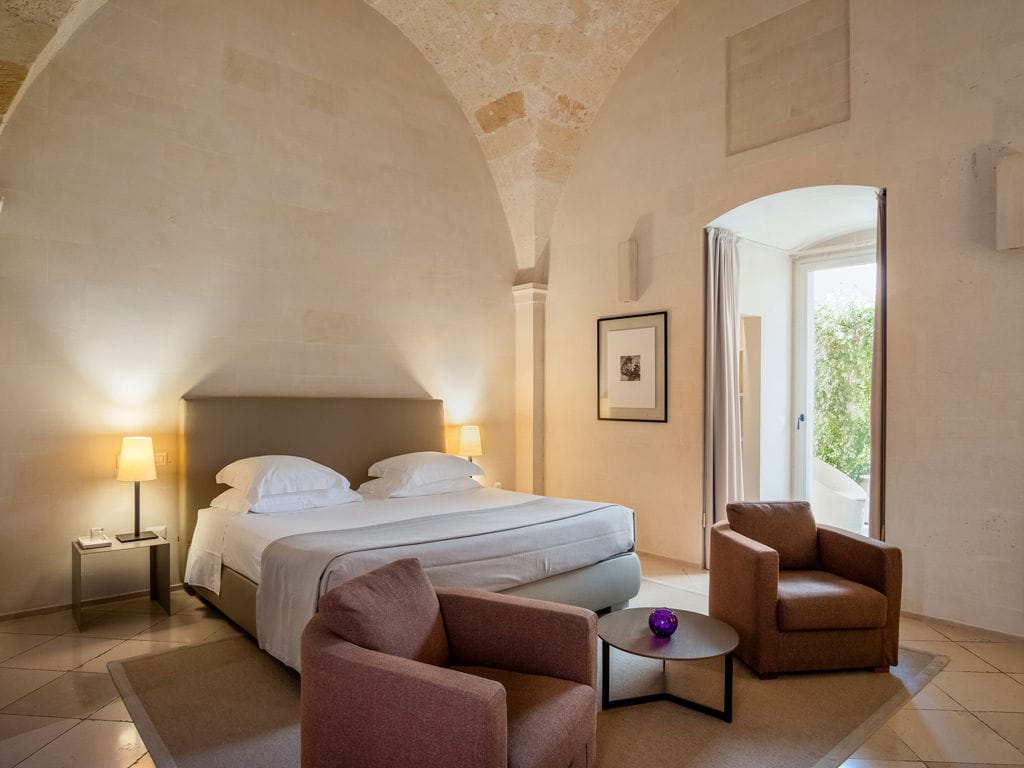
La Fiermontina Urban Resort
The 16 rooms and suites are cool, stylish and the majority have a terrace or walled courtyard. Minimalist interiors combine vintage and designer pieces by Le Corbusier, Tobia Scarpa, and Charlotte Perriand, with sculpture and art objects placed against a palette of peaceful beiges.
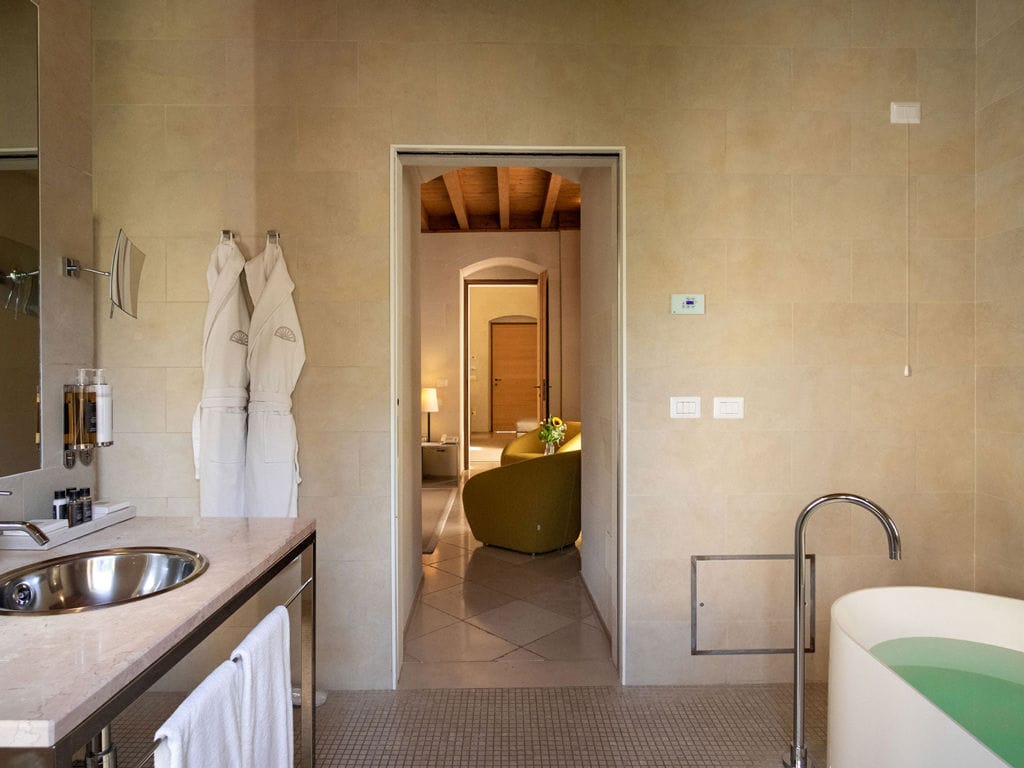
La Fiermontina Urban Resort
The Antonia Fiermonte Suite, with 18th-century stone groin-vaults and alcoves, and the contemporary Pool Suite (in an annexe immediately over the alley), each with their own private dipping pool, are the most remarkable. The luxurious bathrooms have large walk-in showers and, in some cases, freestanding bathtubs. Remember that the split-level
Romantica suites have bedrooms on the mezzanine and bathrooms below. All rooms include air conditioning/heating, coffee makers, kettles, minibars, safes, and television.
In nice weather, guests can dine indoors or on the garden patio. Breakfast includes a platter of home-baked breads, fruit salad, and local favourites such as pasticciotto (a short, crispy pastry) and frisa salentina (a bagel-shaped crunchy bread topped with diced tomatoes and olives).
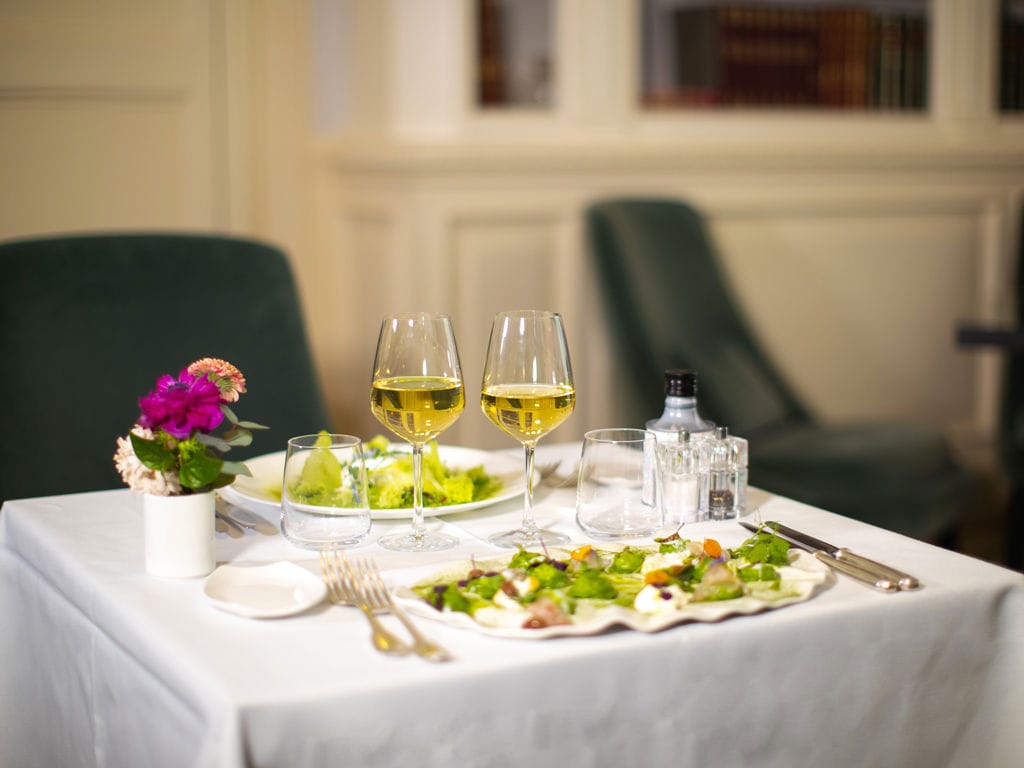
La Fiermontina Urban Resort
The restaurant serves light lunches and evening menus that combine Italian traditions with modern preferences. Seasonal dishes include a carpaccio of Gallipoli prawns, spaghetti with baby tomatoes, garlic, anchovies, and basil, Fassona beef fillet cooked tataki style, and the classic tiramisù.
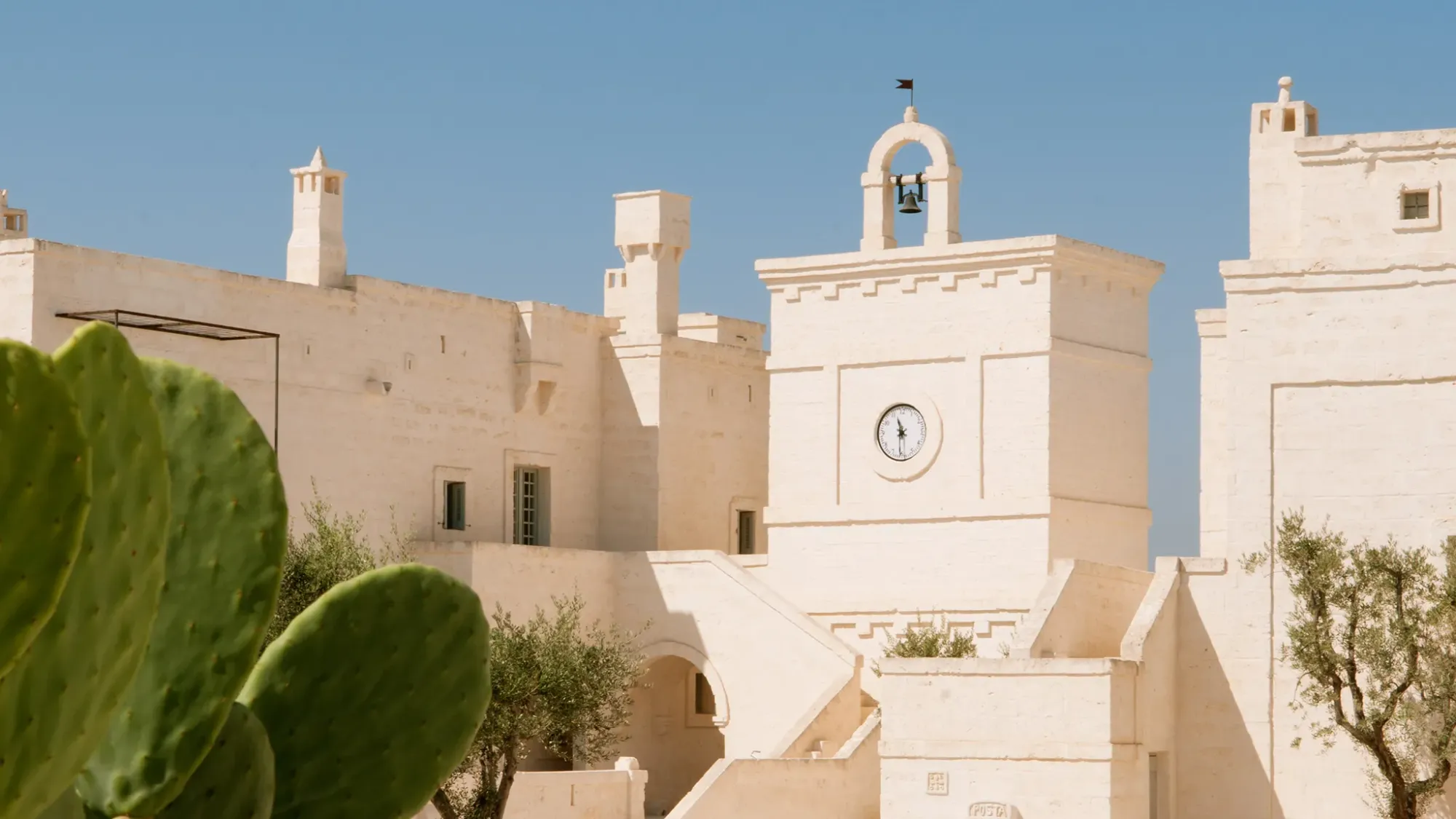
Borgo Egnazia
Borgo Egnazia
In a outstanding location near the seaside town of Savelletri in eastern Puglia., this hotel is located between the ruins of the ancient Roman village that bears its name and the stunning championship golf course of San Domenico.
You can walk around the course (or take the free shuttle bus) to the coast, where you can swim in a rocky cove and visit the Cala Masciola beach club and restaurant. It's conveniently located halfway between Bari airport (40 miles north) and Brindisi (35 miles south).
Puglia, located in the sun-soaked heel of Italy's boot, is a beautiful region rich in cultural experiences and natural wonders. Puglia's gorgeous coastline, filled with fishing villages and sandy beaches, invites visitors to discover its Mediterranean charm.
Trulli, unusual cone-shaped dwellings, dot the landscape, creating a fairytale scene and giving tourists a look into Puglia's architectural originality.
Delicious cuisine entices the taste senses with local specialties like as orecchiette pasta and burrata cheese.
History whispers down the cobblestone alleyways of cities like Lecce and Alberobello, where every corner tells a story from centuries ago. Puglia welcomes you with some incredible hospitality and fantastic hotels. Take a look into our top 10 favorite stays:
Best hotels in Puglia:

Castello di Ugento
Castello di Ugento
Castello di Ugento, a former fortress, is positioned at the highest point in Ugento, southern Puglia, with a view of flat and not always picturesque farmland terrain. It's in the heart of the peaceful town, near to the archaeological museum.
Small supermarkets, pharmacies, and the town's pizzerias are all within walking distance. The coast is 4 miles (7 kilometres) away, so it's worth renting a car to explore the area.
Ex-PepsiCo CEO Massimo d'Amore and his partner Diana Bianchi completed a six-year, €15 million (£13.2 million) renovation of the ancient castle that has been in the d'Amore family since 1643.

Castello di Ugento
The pietra leccese (local stone) walls were sandblasted back to their original honey hue, the walled gardens were meticulously cut, and a team of professionals was hired to recreate exquisite 17th-century murals in the first-floor salons that now make up the museum wing.
Three cutting-edge Electrolux kitchens were custom-built within the walls to create the Puglia Culinary Centre, while former staff quarters flanking a courtyard and a piece of the piano nobile were turned into nine boutique hotel rooms.
It's an impressive, antique monument with contemporary furnishings, modern art, and technological mod-cons bring it up to date, giving it a homely sense despite its size.

Castello di Ugento
The employees are all proud to have been involved in the castle's revitalization, and outstanding service is expected. The personable owners offer local recommendations and renovation anecdotes, while general manager Domenico Avelluto is a true character.
Cooking classes are held in state-of-the-art teaching kitchens. Afternoons can be spent relaxing in the gardens, deciphering the frescoes, or going on an excursion planned by the team.
There is no swimming pool or spa (an underground thermal bath is in the works), but guests can use the outdoor pool, fitness facility, and tennis court at sister resort Masseria Le Mandorle, which is a five-minute drive away, and in-room massages and facials are available.

Castello di Ugento
The majority of the furniture, including creamy handwoven linens and shiny ceramics, are handcrafted by Pugliese artisans. The beds are spacious and quite comfy, and the bathrooms are outfitted with rainfall showers, luxury robes, and organic olive-oil amenities.
The owners' fine eye for modern architecture is matched by an obsession with technology, which means that usual annoyances like inconsistent Wi-Fi, a lack of coathangers, and confusing lighting settings do not exist here.

Castello di Ugento
The food at the Puglia Culinary Centre is exceptional, as one would expect. Il Tempo Nuevo, the hotel's restaurant, serves modern twists on traditional Puglian cuisine, with ingredients gathered from local markets and the castle's kitchen garden. A daily-changing menu might include bottoni cacio e pepe, grilled fish, and deconstructed tiramisu.

Convento di Santa Maria di Costantinopoli
Convento di Santa Maria di Costantinopoli
This hidden gem is located in the village of Marittima di Diso, a half-hour drive from the picturesque town of Lecce, along the meandering coastal road.
The 15th-century Convento is not your average hotel. Lady Athena, the late Lord McAlpine's wife, runs the guest house, which she describes beautifully as a cross between an English country house party and a summer on a Greek island.

Convento di Santa Maria di Costantinopoli
The pleasantly cool and tranquil inner courtyard provides a welcome hideaway from the frequently hot Puglian surroundings, especially in the summer.
The former convent's corridors and galleries are filled with Moroccan carpets, Nigerian wooden carvings, Aboriginal art, Zulu ceramics, Madras glass paintings, Ethiopian manuscripts to banish evil spirits, and 14 tonnes of books, nearly all of which are first editions.
The quality of the items on show is exceptional, and none would look out of place in a museum. There is a gorgeous rooftop terrace with potted cactus plants, as well as a herb garden with over 80 different species of mint.

Convento di Santa Maria di Costantinopoli
The service is really personal and attentive, like staying in someone's summer home. Nothing is too much to ask, and advice from staff for places to dine, drink, swim, and explore are the best you can get.
You can unwind by the pool or in one of the many hidden spots nestled in the enormous garden that surrounds the Convento, or simply sink into the soft cushions in the cool inner courtyard.
Each of the six rooms is furnished in its own style, with some including an elegant bath in the room and others featuring balcony doors that open to overlook the herb garden.

Convento di Santa Maria di Costantinopoli
The ancient beds have hand-embroidered linen and traditional handwoven Salentine bedspreads, as well as thick Welsh blankets for the winter months. There is no air-conditioning, TV, telephone, or Wi-Fi in this location, so be prepared for unexpected surprises. Staying here means embracing unconventional luxury but having an authentic experience.
Forget the traditional Italian breakfast. Instead, visitors at the Convento can eat till late in the morning, feeding themselves from the exquisitely arranged breakfast table, a banquet of sweets and healthy options to begin the day.

Convento di Santa Maria di Costantinopoli
A little later, lunch is served with a plethora of fresh local cheeses, seasonal fruit and vegetables, and, of course, fresh pasta, followed by wonderful but light second courses.
All customers are welcome to stroll in and out of the open kitchen and serve themselves to wine, Italian birra, fizzy drinks, and freshly made snacks, which are available all day.
The chef and his assistants will occasionally share some of the kitchen's secrets with guests so they can try them at home.

Palazzo Tafuri
Palazzo Tafuri
The hotel, located in Nardò's historic district, is surrounded by Moorish and Baroque buildings and directly across from the beautiful Monastery Santa Chiara.
Local stores, pubs, and restaurants are just a few minutes' walk away, and the nearest beaches and the Porto Selvaggio National Park are five miles (8 kilometres).

Palazzo Tafuri
This location is great for woodland hikes and admiring the bay where the pine trees meet the sea creating an unforgettable scenario.
Brindisi is the nearest airport, at 50 miles (70 km), and takes less than an hour to drive from. Bari airport is 130 miles (190 kilometres) away and takes two hours to reach from the hotel.
The proprietors, the Count and Countess d'Espous, gave architects Claudio Colaci (from Salento) and interior designer Vincent De Cat complete freedom and you can see it paid off.
This hotel stands out with its masterful blend of vintage and contemporary furniture. Terracotta pots, linen furnishings, stone floors, and rich velvets are artfully mixed to create a historic yet creative townhouse atmosphere.

Palazzo Tafuri
Countess d'Espous, President of the French Botanic Park Association, ensures that the property's biscuit tones are punctuated by powerful vegetation that is taken care of year around.
The large 17 rooms and suites offer all the amenities of a modern boutique hotel. Bathed in light, they highlight the wonderful architecture of the time.

Each room has a unique design, some have stone vaulted ceilings with painted frescoes and others boasting outdoor terraces. Standard features include stone basins, walk-in rain showers, and premium Ortigia amenities.
The picturesque Tafuri Courtyard restaurant is surrounded by tall cactus. It is the ideal location for an al fresco dining, with thoughtful lighting.

Palazzo Tafuri
Antonio Capoccello, a talented chef from Salento, approaches cuisine with creativity and sustainability. Antipasti include a modern take on the Italian classic vitello tonnato, including Podolica Querceta veal, caper blossoms, and crusco pepper.

La Fiermontina Urban Resort
La Fiermontina Urban Resort
Lecce, one of Puglia's most attractive cities, is a feast for the eyes, with Baroque churches and aristocratic palazzi built in the region's signature golden limestone. La Fiermontina is located at the edge of the old town, nestled in its own olive grove (complete with outdoor swimming pool) and only a 10-minute walk from all of the main tourist attractions.
The hotel is in a limited traffic area, however you can drive to the entrance and use the valet parking facility. The east coast of Puglia is only 20 minutes away by vehicle, and the international airport at Brindisi is half an hour north.
A magnificent Baroque masseria transformed into a trendy urban retreat. The soul of the building is a superb collection of 20th-century art works inspired by the muse, model, and painter Antonia Fiermonte, the present owners' grandmother.

La Fiermontina Urban Resort
René Letourneur's Matisse-like nudes lie alongside Rodin-esque sculptures by Jacques Zwobada - both exceptional French artists who fell in love with Fiermonte. The minimalist interiors are done in light, neutral tones, with plenty of blonde Leccese stone and a mix of vintage and designer furnishings. Outside, the gardens are surrounded by the historic city walls.
The staff is always pleasant, and amenities include luggage transportation, valet parking, cooking workshops, wine tastings, massage treatments, museum excursions, and distinctive experiences that showcase the region's history and customs.
Given its urban surroundings, the isolated olive grove and open-air pool are a welcome during the long Puglian summers. In chilly weather, the fire-placed, art-filled living room is an ideal location to cosy up with one of the many coffee-table novels.

La Fiermontina Urban Resort
The 16 rooms and suites are cool, stylish and the majority have a terrace or walled courtyard. Minimalist interiors combine vintage and designer pieces by Le Corbusier, Tobia Scarpa, and Charlotte Perriand, with sculpture and art objects placed against a palette of peaceful beiges.

La Fiermontina Urban Resort
The Antonia Fiermonte Suite, with 18th-century stone groin-vaults and alcoves, and the contemporary Pool Suite (in an annexe immediately over the alley), each with their own private dipping pool, are the most remarkable. The luxurious bathrooms have large walk-in showers and, in some cases, freestanding bathtubs. Remember that the split-level
Romantica suites have bedrooms on the mezzanine and bathrooms below. All rooms include air conditioning/heating, coffee makers, kettles, minibars, safes, and television.
In nice weather, guests can dine indoors or on the garden patio. Breakfast includes a platter of home-baked breads, fruit salad, and local favourites such as pasticciotto (a short, crispy pastry) and frisa salentina (a bagel-shaped crunchy bread topped with diced tomatoes and olives).

La Fiermontina Urban Resort
The restaurant serves light lunches and evening menus that combine Italian traditions with modern preferences. Seasonal dishes include a carpaccio of Gallipoli prawns, spaghetti with baby tomatoes, garlic, anchovies, and basil, Fassona beef fillet cooked tataki style, and the classic tiramisù.

Borgo Egnazia
Borgo Egnazia
In a outstanding location near the seaside town of Savelletri in eastern Puglia., this hotel is located between the ruins of the ancient Roman village that bears its name and the stunning championship golf course of San Domenico.
You can walk around the course (or take the free shuttle bus) to the coast, where you can swim in a rocky cove and visit the Cala Masciola beach club and restaurant. It's conveniently located halfway between Bari airport (40 miles north) and Brindisi (35 miles south).


